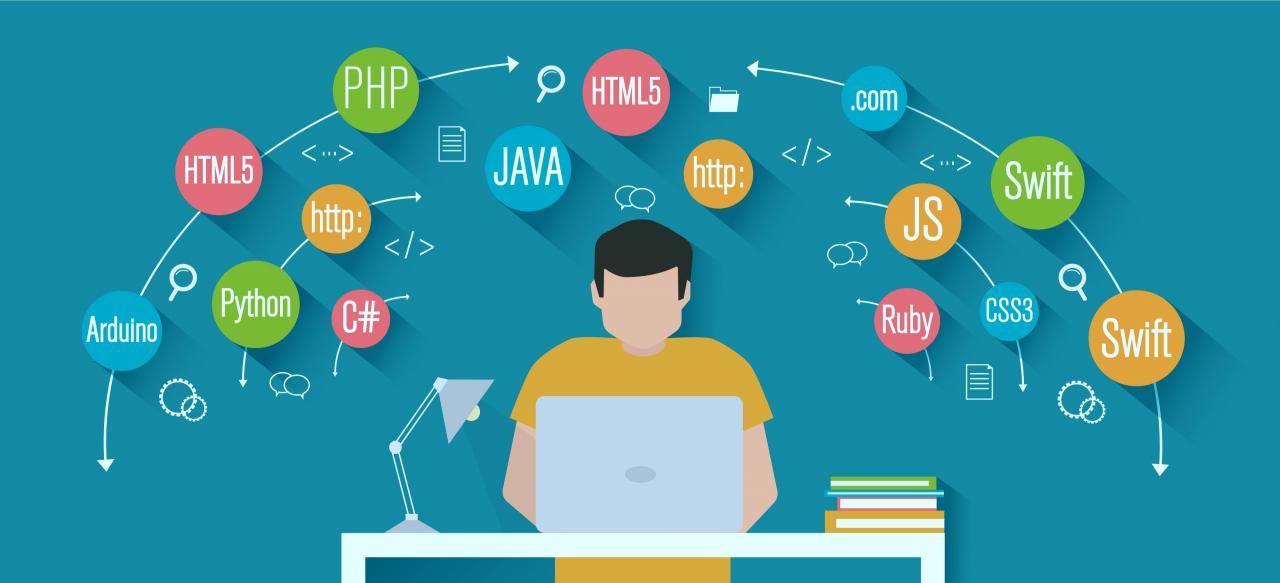From C ++ to Java to Python: Which programming languages are important?

What are the hottest and most popular programming languages? Which ones should you learn and master when working as a developer? We answer these frequently asked questions.
What is meant by “programming language”?
Simple, higher, program-oriented, imperative, graphical, esoteric, or declarative programming language. Machine language, assembly language, scripting language, mini-languages, markup languages, database languages , or stylesheet languages. The most diverse types, forms, and definitions prevail, which are combined under the collective term “programming language”.
The different programming languages have one thing in common that they are used by developers to communicate with “machines”. For example, with computers, mainframes, smartphones, smart home devices, or Internet of Things components. Numerous programming languages have emerged over the past few decades and new ones are constantly being added: Fortran and Cobol come from the 1950s, Python from the 1990s, and Kotlin was released as a stable version in 2016.
The currently most popular programming languages
What used to be popular in a programming language can be outdated today and out of date tomorrow. As in fashion or music, some trends bring some languages up, others crash.
There are various surveys to make these trends tangible. For example from the well-known developer community StackOverflow. For the “2020 Developer Survey”, 65,000 developers were surveyed. In their opinion, these are the programming languages with which they currently prefer to develop:
- Rust
- TypeScript
- Python
- Kotlin
- Go
- Julia
- Dart
- C#
- Swift
- JavaScript
Are you a bit surprised by the result? For example, because there are some exotic languages here and known ones are missing? The answer is: In this evaluation, the focus was on the “loved languages”. In other words, the programming languages with which the participants prefer to program.
Which programming languages are important?
The StackOverflow analysis turns out very different if you look at the languages that are used in the global community as “Wanted” apply. The result of the top 10 is then:
- Python
- JavaScript
- Go
- TypeScript
- Rust
- Kotlin
- Java
- C ++
- SQL
- C #
Like others re-evaluations from?
Are Python and Rust really important? What do developers think outside of the StackOverflow community? Which programming languages do you think are the most popular? The “Popularity of Programming Language Index” of the PYPL page shows a different picture. In the evaluation from August 2020, these languages are at the top:
- Python
- Java
- JavaScript
- C#
- C/C++
- PHP
- R
- Objective-C
- Swift
- TypeScript
Python also dominates here, but Rust, Kotlin or Go, for example, do not appear in the top positions.
The situation is similar with the TIOBE index from :
-
- C
- Java
- Python
- C++
- C#
- Visual Basic
- JavaScript
- R
- PHP
- SQL
Popular and unpopular: programming languages through the ages
The studies mentioned are all snapshots. The following video shows how the popularity of programming languages can change dramatically over the course of several years:
As you can see, Java was the undisputed number 1 in the PYPL index in 2004, while Visual Basic, Perl, and Delphi romped about in the following places in the top 10. 16 years later, Python is in the leading position, Java is well behind in second place.
Visual Basic, Perl, and Delphi were thrown out of the best list. According to the latest StackOverflow survey, they are among the world’s most unpopular programming languages.
Popular programming languages: How does it come about the changes?
Many changes have to do with technological change. The first programming languages were invented to specifically address certain things in the machines of their time. The hardware performance was extremely limited at the time, sometimes every bit and byte really mattered.
The IT world has changed rapidly in recent years. For example, the Internet prevailed across the board, bandwidths increased massively, and storage sizes grew exponentially. New technologies such as smartphones, wearables, and the Internet of Things emerged. 5G is already here, the first smart factories with AI-controlled robots are in place. And there is rapid progress in the area of quantum computers and autonomous driving.
Programming languages are used to address machines of all kinds and to teach them fantastic things. Not every simple, program-oriented, imperative, graphic, script-based, or declarative language is suitable for this.
Which programming language should you use? learn?
There is no general answer to this question. On the one hand, it depends on your level of knowledge and your skills. One has Visual Basic, JavaScript, and Python as an introduction, the other Java, C ++, and C#.
When learning a programming language, always ask yourself first: what is the goal? What should be programmed with it?
Would you like to develop an app, a computer game, or just experiment with your Raspberry Pi? Is it your goal to help develop future-oriented technologies? Or would you like to work in a niche, for example, to keep old mainframes and satellites alive? Could you imagine working as a CRM developer because you are interested in the topic of customer relationship management?
Set yourself goals! Find out which programming language(s) you need to master. As an SAP consultant and developer, for example, you should be able to ABAP, as an e-commerce developer you score with PHP and JavaScript.
Learning programming languages: How many are useful?
Here, too, there is no general statement. On the one hand, it can make sense to be the ultimate programming language expert if that’s exactly what companies are looking for. On the other hand, nowadays T-Shaped Skills are in demand, which means: You are a generalist with one, two or more special fields.
One possibility is to learn a programming language and work from there from further to “shimmy”. Because many are related to each other.

There are also some frameworks and tools that make it easier for you to broaden your horizons. For example, React.js, Vue.js, and Angular are very popular for web development, according to the StackOverflow community. If you would like to work as a passionate gamer in the computer game industry, Unity 3D and the Unreal Engine are ideal.
What you learn is also largely related to your career. If you are learning a job such as an IT specialist for application development or studying computer science at a university, you will come into contact with the programming languages that are given to you. If these are not enough for you, you should look at other languages and frameworks in your free time. Or learn this through special training courses.
Career: Which programming language is the best?
Again, what is your goal? In which industry do you want to work? In a small company or a large corporation? What are you developing? Where do you want to go in the long term? Are you interested in going abroad or should your job be in your home country? All of these factors influence the decision as to which programming language is best suited for your career.
If you have mastered a popular programming language such as Java, JavaScript, C#, C++, Python, or PHP, you have a very good chance of getting one find a new job. This is usually rewarded attractively. Depending on your level of knowledge, professional experience, location, and company size, you will receive an average gross salary of 40,000 to 75,000 euros per year in Germany. If you go abroad, for example to the USA, you can expect significantly higher salaries.

